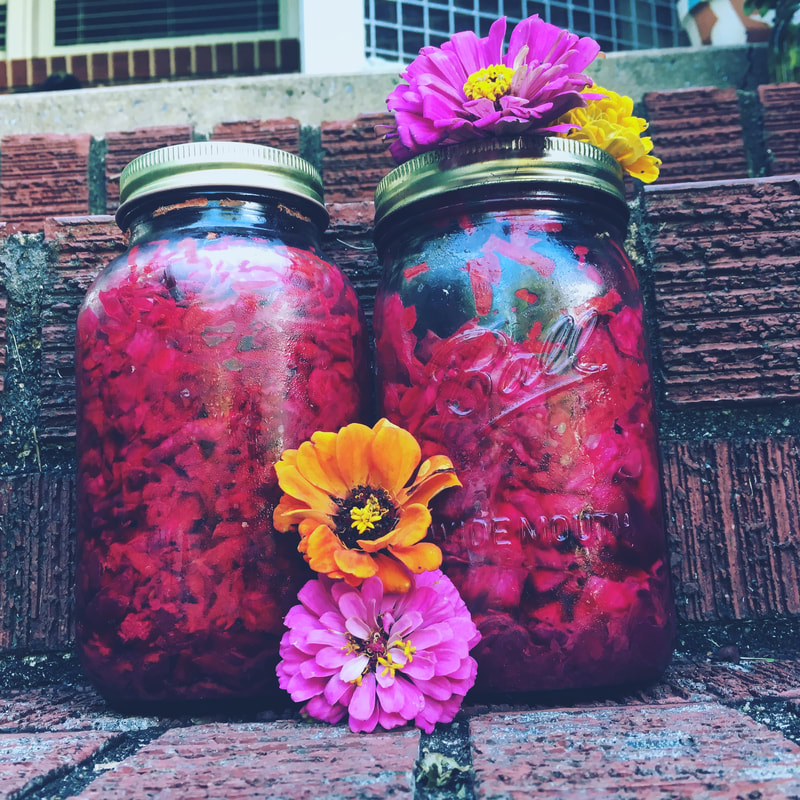|
Fermenting. It may be the single most powerful and affordable remedy for lasting health. Anybody can and should ferment. Human bodies are dependent on fermentation, and this relationship is deep, evolving overtime. For one, fermentation made food available to our ancestors during the hungry winter months. Every culture has a fermentation tradition. If they didn’t, they died. Secondly, fermentation makes digestion easier and nutrients more bioavailable (available for our cells to use). Thirdly, fermented foods provide a healthy dose of probiotics (our mutually symbiotic good bacteria). Fermentation has the potential to eradicate numerous modern diseases characterized by chronic inflammation and poor gut health. Diets rich in fermented foods foster healthy lives. This all has to do with the microbial life in our gut. The bacteria in our bellies dictate every aspect of our being. If we can maintain healthy microbial life in our gut, we are laying the foundation for good health. Daily fermented food is the ultimate preventative medicine. And it is much more affordable than relying on supplements. Wild fermented food uses naturally occurring bacteria to transform raw veggies to vitamin and mineral rich food. Fermentation is alchemy! Food has a ton of potential energy in the form of nutrients, but if we can’t access those nutrients, we are missing out on a wealth of quality nutrition and allowing waste to accumulate inside us. Oftentimes, we are unable to absorb all of food’s energy because of either poor digestion, lack of enzymes, presence of toxins, and/or poor food preparation. These problems are connected, and they can be solved with ferments. First off, we need adequate stomach acid (pH 1.5-3). Our body uses this powerful acid to completely dissolve food and to send signals to our sphincter valve, telling it to close. The sphincter valve separates our tender esophagus from our tough stomach. If it remains open, stomach acid will splash up into our esophagus. Adequate stomach acid signaling prevents this from happening. When we have deficient stomach acid (which worsens with age), food can’t be dissolved and our sphincter valve remains open. This is a primary cause of heartburn- not excessive stomach acid, like antacid companies would like you to believe. Furthermore, enzymes, which break down food, can only be activated in acidic environments. No enzymatic action because of low stomach acid means further indigestion. Lastly, our body kills bad bacteria, fungi, viruses, and protozoa by creating a highly acidic environment that allows the acid-tolerant beneficial microbes to pass through into the small intestine. If your stomach acid is deficient, the bad guys aren’t killed, passing through into the small intestines, colonizing them, and causing all sorts of issues. We can remedy this imbalanced state by fostering sufficient stomach acid for complete digestion. Much like apple cider vinegar stimulates gastric juice secretion, the acidity of fermented foods tells our bellies it is time for digestion. The bacteria that ferment food are the bacteria that reside in our guts. When bacteria ferment food, they start the digestion process for us. When we eat a fermented food, we aren’t only welcoming healthy populations of good bacteria into us, but we are ingesting a food already primed and prepped to be easily absorbed by our hungry, hardworking cells. If food can’t be broken down completely, waste accumulates, jeopardizing every body system and setting the stage for numerous discomforts and disease. Heartburn, colitis, arthritis, high blood pressure- if it’s connected to inflammation, it’s connected to gut health in some way. Adequate stomach acid, promoted by fermented food, fosters healthy microbial populations, or probiotics. Probiotics are live microorganisms that provide health benefits to their host. The gut is the jungle of the body- it is a biodiverse region teaming with trillions of microbes (bacteria and yeasts). Even germaphobes who eat no fermented food or veggies are still internally crawling with bacteria. It’s a complex environment that we are only beginning to understand. But we do know one thing: chronic inflammatory conditions, degenerative diseases, and neurological imbalances like autism and depression are all linked to insufficient probiotics in the gut. A little bit of live ferments goes a long way. Just as too many “bad” bacteria wreck havoc, too many “good” bacteria can also turn into a negative situation, or dysbiosis. For example, someone who eats bowls of kimchi, liters of kombucha, sourdough bread, and nutritional yeast with every meal might be feeding his bacteria rather than his own cells, causing him belly distension and discomfort. It’s all about the balance. “Good” bacteria in wild ferments keep the bad guys like Candida and E. Coli at bay, but healthy guts need these “bad” guys in small numbers to maintain the balance. It’s only when they invade areas they aren’t supposed to be or proliferate extensively that issues arise. By eating a little bit of fermented food each day, washing your hands, meat, and vegetables, and keeping simple sugar ingestion to a minimum (Candida and cancer cells need simple sugar to thrive), you are ensuring that you have a well balanced microbial community with the right ratio of good versus bad guys. The gut is the source of life! Foster a healthy one by eating wild ferments every day. A Very Abbreviated List of What Gut Bacteria Do
Wild Fermented Veggie RecipeIngredients
1 cabbage Handful of carrots Handful of radishes Optional- any hard veggie (otherwise, it will be mushy) : onion, garlic, kohlrabi, turnip, etc. Coarse sea salt Crushed black pepper, cumin, coriander, fennel seeds (any spice you like, or none!) Cabbage naturally has a lot of bacteria on it- you will use these wild bacteria as your wild starter culture, rather than buy a prepared and standardized culture kit. A culture refers to the living microbial communities that create and perpetuate fermentation. Cabbage is cheap and has great texture, but you can use any veggie. For any veggie you ferment, be sure you get organic. Organic veggies have more naturally occurring bacteria on them and no harmful pesticide residue. If you don’t have access to organic, just be sure you thoroughly wash and remove the exterior leaves and/or peel. Chop up all your veggies. The finer you chop, the more surface area you expose to be colonized by your good bacteria, speeding the fermentation process. Gradually sprinkle coarse sea salt on your chopped material as you go. This will start to draw out the juices, beginning the fermentation process. In fermentation, the bacteria will gradually turn plant sugars to lactic acid, pre-digesting the plant fibers and unlocking extra nutrition. Fermentation of veggies happens in three stages of bacterial populations, much as succession in a forest takes place with each previous population transforming the environment to allow subsequent populations to flourish. All of this is dependent on pH. First Coliforms colonize the veggies, creating a more acidic environment for Leuconostoc populations to thrive. This stage creates carbon dioxide as a byproduct of acid formation. As pH continues to drop, Lactobacillus populations colonize for the complete fermentation process. Place all your chopped, salted veggies in a large bowl or bucket. This is the stage where you want to really want to start bruising the plant material, drawing out even more juices. You can use your fist, picking up handfuls of veggies and squeezing repeatedly. Or you can use a wooden spoon to pound and crush. You don’t want to use silverware, as it is very antibacterial. Hands and wood are the best tools here. Continue sprinkling salt and crushing until liquid drips from a handful of squeezed plant material. Salt not only draws out water, but it’s a preservative and safeguard against bad bacteria that turn the veggies mushy. Stuff your crushed and salted plant material into a wide-mouth jar. Wide mouth jars are good because you can stick your hand deep into them and they offer a large target for air microbes to colonize your veggies. The tighter you pack, the better! Keep packing and pressing down with your fist or spoon. You want to completely submerge the densely packed plant material in its own briny juices. The good bacteria are anaerobic- this means they don’t like oxygen and prefer being submerged in water. Sometimes it takes a few hours for the salt to draw out enough liquids. You can return periodically to keep packing it down, or you can go ahead and add some raw apple cider vinegar or a brine made of 1 tbs. salt per 1 cup water. However, if you are using fresh veggies and have adequately chopped, salted, and pounded, it should completely submerge in its own juices. The amount of salt used can vary greatly. I typically come out using about 1 tablespoon per quart chopped veggies. When you’ve packed down all your veggies as much as possible, get a clean plate, can, or heavy jar to weight down your veggies. Anything could work- just find something that fits snug inside your jar. Cover this with a clean piece of cloth, the more breathable the better. Fasten with a rubber band if you wish. Place the jar on a shelf away from direct sunlight. If you store it immediately in the fridge or in a cool basement, the fermentation process will occur slower and last longer. If you make it in the summer and leave it on a warmer shelf, it will ferment faster and therefore go bad faster. I typically like to leave it out on a shelf for a few days, checking up on it to ensure it’s all still submerged and packing down more if need be. Then, I’ll pop it in the fridge and start eating it. By the time I’m down to a quarter left, I’ll start a new batch using that same bacteria-rich brine. If you continue using this starter culture every time you make a new batch, your fermented veggies will become increasingly probiotic. You can even strain off some of the extra brine and use it as a daily probiotic swig. Dr. Mercola has a starter culture of probiotics especially effective at manufacturing the much-needed but little-respected vitamin K2. Any plant material not submerged in the salty brine will mold. If this happens, it is okay! Just scoop out that portion and make sure the rest is still packed down in liquid. This mold is merely a surface phenomenon of plant material in contact with the air. |
Eileen Brantley & Amy WrightWe are Herb Girls Athens, LLC. Read our blog! Archives
November 2022
Categories
All
|


 RSS Feed
RSS Feed
